Ride-hailing giant Bolt announced today it has drafted a proposal to introduce industry-wide standards for Malta’s ride-hailing and food delivery sectors, proposing a “Seal of Standards” for fleets and a Charter for platforms.
The initiative, revealed in a statement today, aims to create what the company describes as a “collaborative framework” with the Maltese government and an independent third party to ensure all industry players operate on consistent standards.
“We are committed to working with all industry players and the local authorities to develop a framework that fosters a sustainable and transparent environment for all,” said Andrea Vota, Head of Public Policy & Regulatory Affairs for Southern Europe at Bolt.
The proposal has received backing from the Malta Food Delivery Fleet Operators Association (MDFOA) and the Malta Y Plate Association (MYPA), which issued a joint statement supporting the initiative’s focus on “sustainability and ensuring a compliant future” for both sectors.
However, the announcement comes at a time of intense scrutiny over working conditions in Malta’s gig economy. In March, authorities began arraigning 39 fleet operators following a Department For Industrial and Employment Relations investigation that allegedly uncovered widespread violations of regulations designed to provide employee rights to delivery workers.
The sector has been marked by persistent labour disputes. Just two months ago, food couriers met with competitor Wolt Malta to demand improved working conditions and fairer pay, with workers claiming they surrender up to half their earnings to fleet operators while receiving an average of just €3 per delivery before commissions.
The challenges extend beyond individual companies. Malta’s rapid expansion of foreign workers in the transport sector has created tensions, with more than 300 foreign drivers receiving Transport Malta permits in the five months after prime minister Robert Abela declared the country had “enough taxi drivers.” Throughout 2024, only 296 of Malta’s 1,188 new cab drivers were Maltese nationals.
The Light Passenger Operators Association has questioned how fleet sizes continue expanding despite claims of reduced driver numbers, noting that cab prices have returned to 2023 levels, suggesting market oversupply persists.
Bolt’s own relationship with its workforce has been turbulent. Three years ago, 95% of the company’s food couriers participated in a strike that brought operations to a virtual standstill, with workers protesting pay rates as low as €2.60 per delivery and the requirement to surrender up to 50% of earnings to employment agencies.
While today’s proposal focuses on industry standards and regulatory compliance, it notably makes no specific mention of worker conditions, pay rates, or employment rights—issues that have dominated recent sector discussions.
Bolt indicated that this proposal is “just one of several measures” the company is developing, with additional announcements expected in the coming days.
Malta’s economic model facilitates worker exploitation, with a staggering 1,695 Maltese companies found illegally employing third-country nationals in 2023 alone. Disturbing reports indicate that many of these workers endure abusive and precarious conditions.
The government’s stance on foreign workers has noticeably hardened since the June 2024 elections, which saw the Labour Party lose its super-majority.
Prime minister Robert Abela recently conceded that the intensified clampdown on third-country nationals was partly a response to shifts in public opinion. In late July 2024, Abela controversially stated that foreign workers lured by non-existent jobs should return to their home countries, later confirming that even potential victims of human trafficking would be denied their legal rights and instead be repatriated.
Despite these policies, the economic contribution of these workers is substantial. Finance minister Clyde Caruana revealed in 2023 that the government collected over €85 million in taxes from 60,457 third-country nationals working in Malta.
However, despite their significant economic impact, many migrants in Malta face severely limited access to fundamental rights and essential services, including clear pathways to residency and citizenship. Instances of exploitation by both employers and landlords are reportedly widespread, often compelling individuals into the shadow economy.
